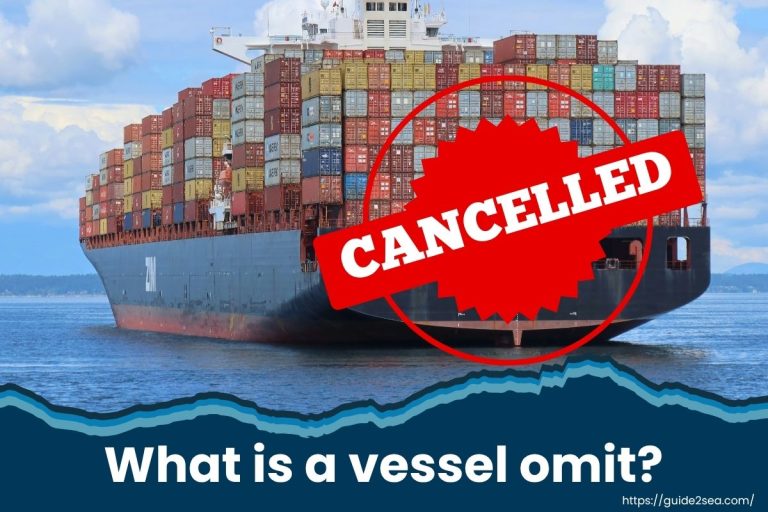Say you are about to go on a trip, voyage, or journey by the usual train, bus, tram, or metro. You hear the announcement that your train, bus, or metro has been cancelled. You may wait for the next one with frustration, wondering how the delays will affect your plans. Surprisingly, shipping works in a similar way.
Sometimes ships skip a scheduled port visit. In maritime language we don’t use the words “cancel” or “skip.” Instead we say the “vessel omits the port.” As a student or professional in the shipping industry, it is important to understand what this means and how it can affect cargo, logistics, and the overall supply chain.
What Does “Vessel Omit” Mean?
Shipping companies have pre-created schedules for ships to visit ports in a specific order. Each stop is called a port call. Sometimes, for various reasons, a vessel may skip one of these scheduled stops. In maritime terms, this is called omitting the port. This does not mean the ship’s journey is cancelled. The vessel is still on the voyage and moving to other ports in the schedule.
Shipping lines usually announce these changes in schedules, notices, or tracking systems. Knowing what a port omit is important for everyone in shipping and logistics. Because it affects delays of goods and other logistical plans.
Why Do Ships Omit Port?
There are several reasons why a ship may skip a port. Some of the common factors include:
- Weather Conditions—A bad weather condition such as storms, rough seas, or cyclones can make it dangerous for a ship to dock at a port. Shipping companies prioritize safety. So that they may decide to avoid the port to protect the ship, crew, and cargo.
- Operational Problems—Sometimes a ship may face technical problems like engine trouble, insufficient fuel, or other technical issues. It makes it unsafe or impossible to dock on schedule. If the ship cannot safely dock, the port may be omitted.
- Port Congestion—Ports like Singapore, Rotterdam, or Los Angeles are very busy in handling cargo. Ships may have to wait for a long time to dock. In these cases, to avoid delays and maintain the schedule, shipping companies may skip the port.
- Commercial Issues—Shipping lines make decisions based on cargo priority. If a port has fewer cargo shipments, the vessel might skip that port. It is to maintain profitability and meet deadlines at other ports.
- Political or Legal Restriction—Political tensions, strikes, port restrictions, or regulatory changes may prevent ships from docking. In such incidents omitting the port becomes a necessary action to continue the voyage.
- War Situation—The ongoing war situation in some regions has affected the global shipping. Some ships may avoid the ports in these regions in order to protect the ship, crew, and cargo.
What Is the Impact of a Vessel Omitting a Port?
When a ship skips a port, it affects various fields aligned with shipping and logistics.
1. Delivery Delays
When a ship skips a port, the most immediate impact is the late delivery of cargo. Goods are supposed to arrive at the port on a specific date. But when avoiding a port, it may take several extra days to reach the destination. This can affect the entire supply chain.
2. Additional Cost
Skipping a port often leads to extra costs. Cargo might need temporary storage at another port, be rerouted to a different destination, or be transported faster to meet deadlines. Additional fees for handling, customs, or transportation may appear. These unexpected expenses can affect both cargo owners and shipping companies.
3. Re-routing Option
When a ship omits a port, cargo needs to be rerouted. Shipping lines and freight forwarders might send goods to a nearby port or transfer them to another ship. Re-routing takes careful planning to make sure cargo is not delayed further or damaged along the way.
4. Challenges in Cargo Handling
A port skip creates extra challenges for cargo handling. Certain goods, like perishable items, chemicals, or temperature-sensitive cargo, may need special care.
5. Impact on Crew Change
When a ship skips a port, it also affects the seafarers on board the ship. Crew change is often planned at a port. If a ship skips the port, the crew change gets delayed. It directly affects the crew schedules, rest periods, and work plans.
6. Effect on Supply Chain
When a port is omitted, it affects the entire supply chain. Because businesses need to adjust procurement, inventory, and delivery schedules. Importers may have to notify customers about the delays, reschedule shipments, and revise business plans.
7. Clear Communication
Communication is very important when a port is skipped. Shipping lines, cargo owners, port authorities, and logistics teams need to know immediately. Clear updates help businesses adjust their plans, avoid confusion, and reduce delays.
Who Should Know That the Vessel Has Omitted the Port?
A vessel omitting a port also affects many people and businesses involved in the shipping.
- Cargo Owners and Importers— Cargo owners and importers are directly impacted because their goods may be delayed or re-routed. This makes a mess of inventory management, production schedules, and business operations. Knowing that the port has been skipped will help to know when and where their cargo will arrive.
- Freight Forwarders and Logistics Companies— Freight forwarders and logistics companies are responsible for managing the movement of cargo. When a port is omitted, they must quickly adjust logistics plans, reroute cargo if necessary, and coordinate with ports, shipping lines, and customers. Their role becomes critical in minimizing delays, avoiding extra costs, and keeping the supply chain running smoothly.
- Port Authorities— Port authorities are directly affected because they need to manage incoming traffic, docking schedules, and port operations. When a vessel omits a port, the authorities must update schedules and coordinate resources for other vessels that may arrive on time.
- Seafarers on Board— When a ship skips a port, it changes the ship’s schedule. It affects seafarers with longer sailing times or additional operational duties. Crew members must adjust their routines, cargo handling plans, and readiness for the next port call.
In short, anyone connected with cargo, ships, or ports should be aware when a ship omits a port. Because a proper action can be taken to minimize the disruptions.
Real-World Example
Vessel omissions are common in many major ports around the world. For example, in Colombo, Sri Lanka, ships may skip the port during busy seasons to avoid long waiting times. Rotterdam, one of Europe’s largest ports, often experiences congestion, which can cause ships to adjust their schedules. In Shanghai, China, high traffic and tight schedules sometimes result in vessels omitting port calls.
Sometimes skipping a port seems to be a good solution to maintain the overall schedule and avoid longer delays. It also creates inconvenience for shippers and clients.
Final Thought
A vessel omitting a port may seem to be a small notice in a shipping schedule. But it can create significant effects on cargo, logistics, and global trade. Understanding what it means and why it happens helps shippers, businesses, and freight forwarders to plan their shipment effectively.



